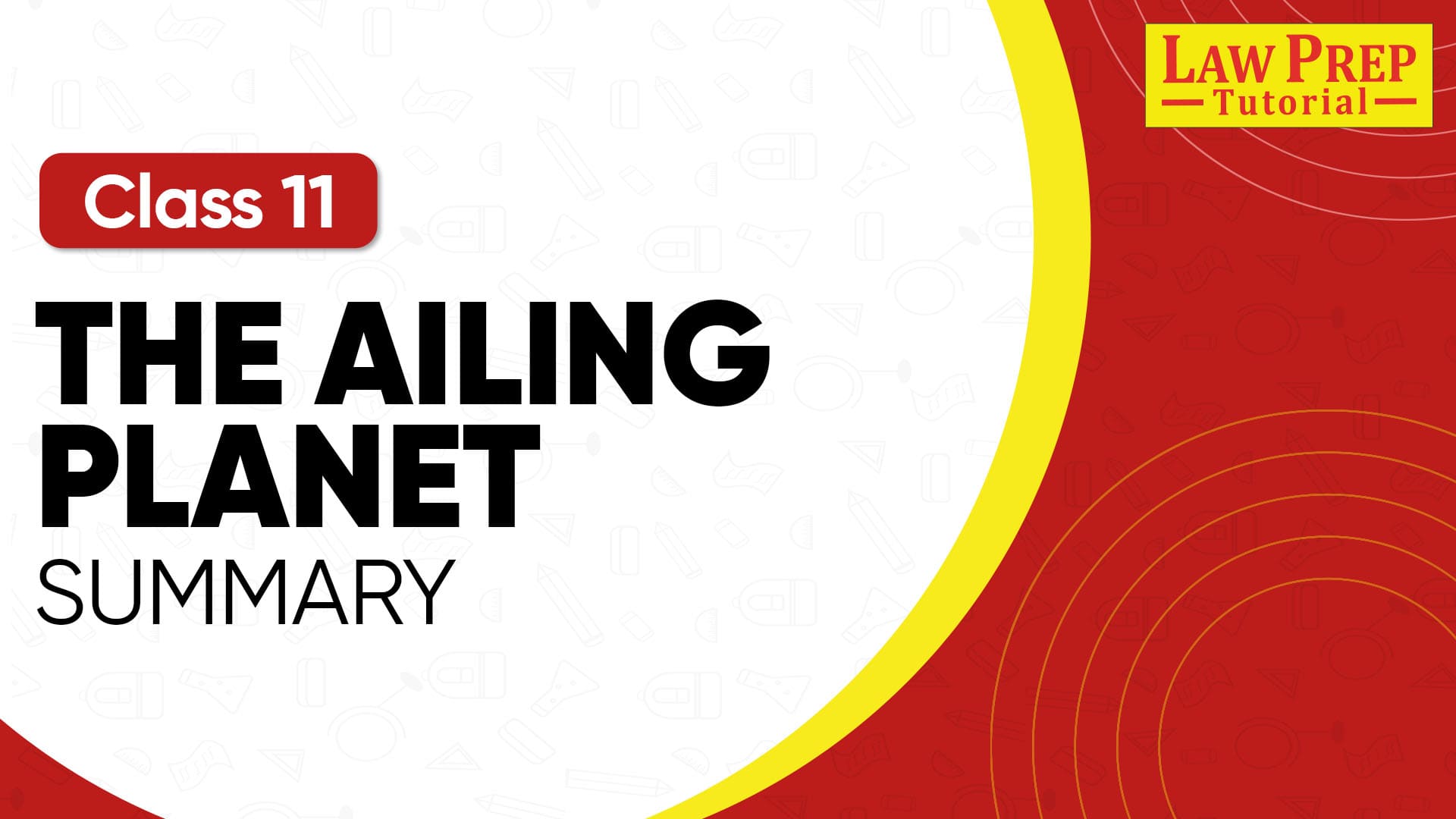The Ailing Planet: The Green Movement’s Role by Nani Palkhivala is a story that connects to real life. If you are searching for its summary, this blog will help you.
The essay discusses how our planet is under stress due to deforestation, overpopulation, and careless use of resources. Through the summary of The Ailing Planet, you’ll understand the importance of sustainable development, the idea of Earth as a living being, and our duty to protect it.
Summary of The Ailing Planet: The Green Movement’s Role
Nani Palkhivala’s essay The Ailing Planet: The Green Movement’s Role is a powerful reminder that our Earth is under stress. It explains how human greed and careless exploitation of resources have made the planet sick, and why urgent action is needed to save it.
The chapter begins with the rise of the Green Movement in 1972, a global effort to protect the environment and promote sustainable development. This movement changed the way people view Earth—not just as a resource to exploit, but as a living being that needs care and respect.
The author presents the idea that humans are not the masters of Earth but its trustees. We have borrowed this planet from our children, and it is our duty to return it in a healthy condition. This shifts the focus from ownership to responsibility.
Palkhivala discusses four key issues threatening the planet:
- Forests: Rampant deforestation has endangered biodiversity and disturbed ecological balance.
- Land: Overuse of soil through farming, mining, and urbanization has degraded its quality.
- Water: Freshwater sources are depleting and pollution is making them unsafe.
- Population: The growing human population is putting immense pressure on limited resources.
He highlights the concept of sustainable development, which means using resources in a way that meets present needs without compromising the future. Education, awareness, and responsible governance are vital to achieving this balance.
The Ailing Plant also notes that many countries have started taking steps, such as monitoring environmental health and making laws for conservation. However, much more is needed. Palkhivala urges every individual to take responsibility because small efforts, when combined, can make a big difference.
In conclusion, the chapter conveys that Earth is an ailing patient, and humans must act as responsible doctors. The survival of future generations depends on how wisely we act today. By adopting sustainability, respecting nature, and thinking globally, we can heal our planet and secure a better tomorrow.
Short Summary of The Ailing Planet: The Green Movement’s Role
Nani Palkhivala’s essay The Ailing Planet: The Green Movement’s Role stresses the urgent need to protect our environment. He begins by mentioning the Green Movement of 1972, which made people realize that Earth is not just a resource to exploit but a living being that must be cared for. The author explains that humans are trustees, not owners, of this planet, and we have borrowed it from future generations.
He highlights four major issues: depletion of forests, degradation of land, scarcity of clean water, and population growth. These problems have made Earth fragile and unbalanced. Palkhivala emphasizes sustainable development—using resources responsibly so that future generations are not deprived. He calls for awareness, education, and laws to protect the environment.
The chapter concludes that Earth is like a sick patient, and we must take urgent steps to heal it. Protecting nature is essential for human survival.
More Important Resources for CBSE Exam:
| Class 11th Hornbill Syllabus | CBSE Class 11th Commerce Subjects |
| CBSE Full Form | All about CBSE Class 11th |
| Class 11th Syllabus | Class 12th Syllabus |
| Class 11th Commerce Books | CBSE Board: All details |
Theme of The Ailing Plant by Nani Palkhivala
- Environmental Degradation: How forests, land, and water are being destroyed.
- Sustainable Development: Meeting present needs without harming future generations.
- Human Responsibility: Humans as trustees, not owners, of Earth.
- Population Pressure: Rising population straining natural resources.
- The Green Movement: A turning point in awareness and conservation.
- Earth as a Living Being: The planet compared to a patient that needs healing.
Important Quotes from The Ailing Planet
- “We have not inherited this Earth from our forefathers; we have borrowed it from our children.”
- “The earth’s principal biological systems are four—fisheries, forests, grasslands, and croplands.”
- “The emerging new world vision has ushered in the Era of Responsibility.”
- “Are we to leave our successors a scorched planet of advancing deserts and impoverished landscapes?”
- “The ailing planet is crying out for survival.”
Lessons from The Ailing Planet: The Green Movement’s Role
- Respect Nature: Treat the Earth as a living being.
- Practice Sustainability: Use resources wisely for future generations.
- Control Population Growth: Reduce pressure on limited resources.
- Global Responsibility: Environment belongs to all; everyone must contribute.
- Awareness and Action: Education, laws, and individual responsibility can save the planet.
Read the chapter-wise summaries of Class 11 English here:
FAQs About The Ailing Planet Summary
The essay is written by Nani Palkhivala, an Indian jurist and environmental thinker.
The chapter highlights the urgent need to protect the environment through sustainable development and human responsibility.
Because human activities like deforestation, pollution, and overpopulation have made the planet weak, like a sick patient.
The Green Movement, started in 1972, is a global initiative to conserve the environment and promote sustainability.
It means using resources in a way that meets present needs without harming the needs of future generations.
Forests, fisheries, grasslands, and croplands.
They provide food, raw materials, and ecological balance for survival.
It shows that Earth belongs to future generations, so we must protect it responsibly.
Uncontrolled population growth puts immense pressure on forests, land, water, and food resources.
Some countries have created laws, monitoring systems, and awareness programs for conservation.
Because environmental issues like climate change, pollution, and deforestation are global challenges.
Find detailed questions and answers from all chapters of English Class 11 now:
Check the latest CBSE Class 11 syllabus for all subjects below:
Explore the updated CBSE Class 12 syllabus for all subjects here:
Discover CLAT exam resources that can help you get started early:
Explore CLAT coaching centers across different cities:


